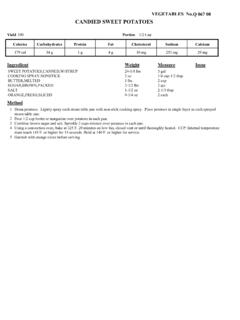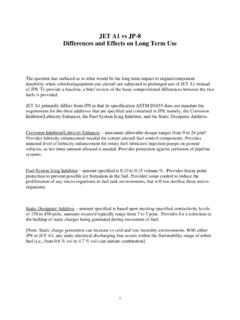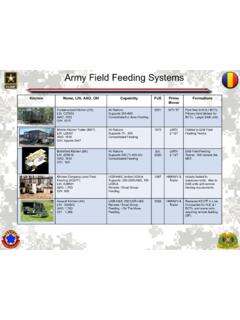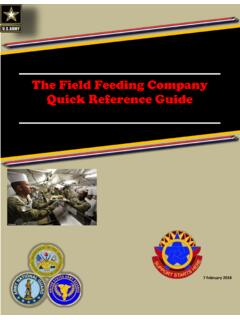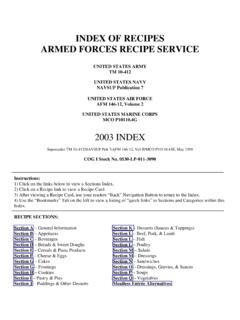Transcription of Supply and Services (CMF 92) Career Progression Plan ...
1 Supply and Services (CMF 92) Career Progression Plan Chapter 1 Duties The Quartermaster Corps performs Supply and Services functions for the Army for all classes of Supply except medical and ammunition. The Quartermaster Corps is responsible for Supply Support, Field Services , Aerial Delivery Support, Materiel and Distribution Management, Combat Developments, Doctrine Training and Professional Development of all three components, civilian personnel, Allies in Quartermaster proponent and common skills areas. Note. All Quartermaster CMFs and MOSs are open to male and female Soldiers; however, DCPC coding of positions precludes assignment of females to certain combat arms units. Chapter 2 Transformation The Army Quartermaster Corps is the nation s oldest combat service support branch. conversion to operational Army units was one of the most significant changes in our Armed Forces since World War II. As modern warfare increases in technological sophistication, speed, and complexity so must our logistics systems change.
2 The underlying duties and functions of the Quartermaster enlisted Soldier will not change; how we do them will. We will move from a Supply -based system that relies on logistics mass, to a system which relies more heavily on information supremacy and distribution agility and exploits improvements in logistics velocity and automation. To provide continued support to the Army s Brigade Combat Teams; Quartermaster Soldiers must continuously refocus themselves for this new and evolving environment and apply the same innovation, teamwork, battle focus, selfless service and professionalism that made us so successful during the past 241 years. The Quartermaster Corps requires Soldiers who are technically and tactically competent and NCOs who are, first and foremost leaders of Soldiers. Noncommissioned Officer must be multidimensional logisticians that are technically and tactically proficient in logistics operations at all echelons, tactical, operational, and strategic, not only in an Army environment but joint and international.
3 Noncommissioned officers must also seek out the tough assignments and training to be prepared to perform at their current and next rank. NCOs must also ensure that the younger Quartermaster Soldiers can perform their individual MOS tasks and constantly be a role model. To ensure the Quartermaster Corps transforms with the Army successfully, we need all Quartermasters working together, Soldiers, NCOs, Warrant Officers, Officers and Civilians across the total force. In the history of our Army, no major operation has ever failed because Quartermaster failed to provide the right supplies, at the right time and place, and in the right quantities. Quartermaster Soldiers are expected to continue these traditions as our Army Sustainment transitions to fully auditable operations through Global Command and Control System Army (GCCS-A) . Demanding assignments for CMF 92 include but are not limited to Special Operations Command (SOCOM), Theater Special Operations Command (TSOC), Joint Special Operations Command (JSOC), and United States Army Command (USASOC).
4 There are numerous assignment opportunities within USASOC to include 1st Special Forces Command (SFC), United States Army JFK Special Warfare Center and School (USAJFKSWCS), Army Special Operations Aviation Command (ARSOAC), 75th Ranger Regiment, 160th Special Operations Aviation Regiment (SOAR), and Special Mission Units (SMU). Soldiers assigned to these commands could have longer than normal utilization tours due to mission and training requirements. These positions should be considered as Career enhancing assignments. Career Manager/Development NCO, Training with Industry, Special Duty Assignments such as enlisted Aid (EA), Inspector General (IG), Equal Opportunity Advisor (EOA), Sexual Assault Response Coordinator (SARC), Recruiter, First Sergeant, Platoon Sergeant, AIT Platoon Sergeant, Instructor and Writer, Drill Sergeant Linguist positions, and Security Force Assistance Brigade (SFAB) positions should be considered as broadening assignments.
5 Soldiers who have successively served in a Career enhancing or broadening assignment(s) should be considered as highly competitive for promotion. Chapter 3 Recommend Career Management Self-Development by Rank a. Private E-1 - Specialist/Corporal. (1) The quality and success of a Soldier s Career is in direct proportion to the Soldier s consistent commitment to excellence, regardless of the mission. Soldiers committed to achieving high goals will develop leadership skills, talent and have the practical knowledge and ambition to put them to good use. (2) Soldiers should study and master the following military publications: ADP 1, The Army, ADP 1-02, Operational Terms and Symbols, ADP 2, Intelligence, ADP 3, Unified Land Operations, ADP 4-0, Sustainment, ADP 5, The Operations Process, ADP 6, Mission Command, ADP 6-22, Army Leadership, ADP 7-0, Training Units and Developing Leaders. STP 21-1, Soldier s Manual of Common Tasks; TC , Drill and Ceremonies; TC , Map Reading and Land Navigation; TC , Physical Fitness Training; TC , First Aid for Soldiers; TC 21-75, Combat Skills of the Soldier; AR 670-1, Wear and Appearance of Army Uniforms and Insignia; all -10 level maintenance manuals associated with their equipment; and battle drills associated with their current assignment.
6 (3) The following is suggested for self-development: FM 7 , AKO, and contain additional reading material. (4) The OPTEMPO of tactical assignments may limit the opportunity for civilian education; however, those Soldiers willing to make the required sacrifices should seize the available opportunities. CLEP and DANTES are available for those Soldiers unable to pursue formal civilian courses. These self-development options are based on the Soldier s own desire to excel. Ample opportunities exist for Soldiers to participate in various correspondence courses to accomplish individual educational objectives. Soldiers with GT scores below 100 should seek to improve their scores through FAST, as it will limit their ability for developmental assignments in the future. Taking additional civilian education courses such as English composition and basic mathematics will prepare Soldiers for the AFCT and improve promotion potential. Every Soldier must ensure they enroll and complete their Self Structured Development 1 (SSD1) to commensurate with their grade as attendance to Professional Military Education will be restricted until completed.
7 (5) The ACCP also provides excellent educational advancements in continued education, leadership and technical proficiency. Education opportunities can be found at the ACES website. CLEP and DANTES tests are other resources for converting previously acquired knowledge or training into college credit. College education is a critical piece of the self-development program and logisticians should plan their college program around a degree that relates to their MOS using information provided on the SOCAD website. Soldiers may also enroll in GOARMYED, an Army program that gives Soldiers the opportunity to pursue a degree program completely online. (6) Soldier boards, such as Soldier of the Quarter/Year, broaden their knowledge base, instill discipline and improve the Soldier s ability to communicate verbally. (7) Soldiers may also earn promotion points for Technical Certification, a list of certifications can be found on the COOL website at For information on these and other education programs, visit the Army Education Center on your installation.
8 Every Soldier should explore and complete appropriate credentials for their military occupational specialties and/or additional training they have been provided as it demonstrates to leaders and the Army that they have mastered those skills. b. Sergeant. (1) The quality and success of a Sergeant s Career is in direct proportion to a consistent commitment to excellence, regardless of the mission. Sergeants committed to achieving high goals will develop leadership skills and have the practical knowledge and ambition to put them to good use. (2) Sergeants should study and master the following military publications: STP 21-24, Soldier s Manual of Common Tasks Skill Levels 2, 3, ADP 1, The Army, ADP 1-02, Operational Terms and Symbols, ADP 2, Intelligence, ADP 3, Unified Land Operations, ADP 4-0, Sustainment, ADP 5, The Operations Process, ADP 6, Mission Command, ADP 6-22, Army Leadership, ADP 7-0, Training Units and Developing Leaders; TC , Foot Marches; , FM , The Soldiers Guide, 7-22, Army Physical Readiness Training; all -10 level maintenance manuals associated with their equipment and battle drills associated with their current assignment.
9 (3) The following is suggested for self-development: FM 7 , AKO, and contain additional reading material. (4) The OPTEMPO of operational assignments may limit the opportunity for civilian education; however, those Sergeants willing to make the required sacrifices should seize the available opportunities. Soldiers with GT scores below 100 should seek to improve their scores through FAST, as it will limit their ability for developmental assignments in the future. Pursuing a college education at this level is not a mandatory requirement but one that will place you above your peers. Soldiers should plan their college program around a degree that relates to their MOS using information provided on the SOCAD website. Every Soldier must ensure they enroll and complete their Self Structured Development 2 (SSD 2) to commensurate with their grade as attendance to Professional Military Education will be restricted until completed. (5) Soldier boards such as NCO of the Quarter/Year and the Sergeant Audie Murphy/Sergeant Morales Clubs broaden the knowledge base, instill discipline and improve the Soldier s ability to communicate verbally.
10 (6) The ACCP also provides excellent educational advancements in continued education, leadership and technical proficiency. Education opportunities can be found at the ACES website. Soldiers may also gain specific MOS knowledge through the ACT (7) Soldiers may also earn promotion points for Technical Certification, a list of certifications can be found on the COOL website at For information on these and other education programs, visit the Army Education Center on your installation. Every Soldier should explore and complete appropriate credentials for their military occupational specialties and/or additional training they have been provided, as it demonstrates to leaders and the Army that they have mastered those skills. c. Staff Sergeant (1) The quality and success of a Staff Sergeant s Career is in direct proportion to a consistent commitment to excellence, regardless of the mission. Staff Sergeants who are committed to achieving high goals will develop leadership skills and have the practical knowledge and ambition to put them to good use.


